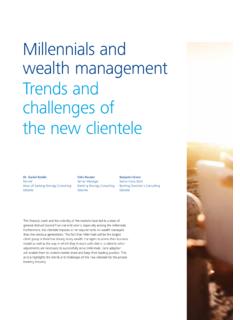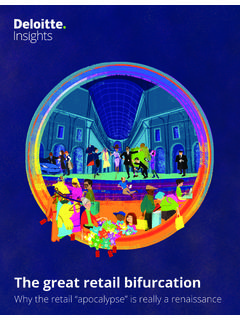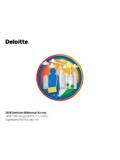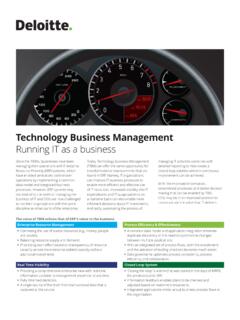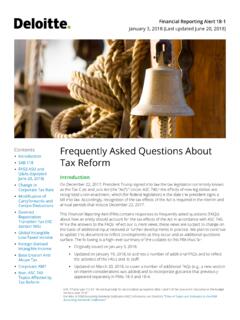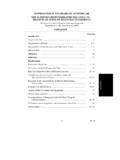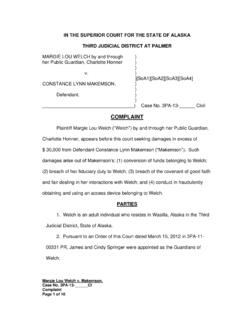Transcription of Sample listing of fraud schemes - Deloitte
1 Sample listing of fraud schemesCentre for Corporate GovernanceThe following listing of possible fraud schemes can be utilized by management and auditors to assist in identifying possible fraud risks, scenarios, and schemes when performing or evaluating management's fraud risk assessments. The listing of fraud schemes is not intended to be a complete listing of all possible fraud schemes for all Revenue RecognitionSide Agreements - Sales terms and conditions may be modified, revoked, or otherwise amended outside of the recognized sales process or reporting channels and may impact revenue recognition. Common modifications may include granting of rights of return, extended payment terms, refund, or exchange.
2 Sellers may provide these terms and conditions in concealed side letters, e-mails, or in verbal agreements in order to recognize revenue before the sale is complete. In the ordinary course of business, sales agreements can and often are legitimately amended, and there is nothing wrong with giving purchasers a right of return or exchange, as long as revenue is recognized in the proper accounting period with appropriate reserves established. Roundtrip Transactions - Recording transactions that occur between two or more companies for which there is no business purpose or economic benefit to the companies involved. These transactions are often entered into for the purpose of inflating revenues or creating the appearance of strong sales may include sales between companies for the same amount within a short time period, or they may involve a loan to or investment in a customer so that the customer has the ability to purchase the goods.
3 Cash may change hands, but payment alone does not legitimize the transaction or justify the recognition of revenue if there is no underlying business purpose or economic benefit for the and Holds - A bill and hold transaction takes place when products have been booked as a sale but delivery and transfer of ownership has not occurred as of the date the sale is recorded. The transaction may involve a legitimate sales or purchase order; however, the customer is not ready, willing, or able to accept delivery Fraudulent Financial Reporting Schemesof the product at the time the sale is recorded. Sellers may hold the goods in its facilities or may ship them to different locations, including third-party Shipping Documentation - By creating phony shipping documentation, a company may falsely record sales transactions and improperly recognize revenue.
4 By altering shipping documentation (commonly changing shipment dates and/or terms), a company can increase revenue in a specific accounting period regardless of the facts and circumstances that the transaction and the resulting revenue should have been recorded in the subsequent accounting to Sell-Through Product - These sales agreements include contingent terms that are based on the future performance of the buyer of the goods (commonly distributors or resellers) and impact revenue recognition for the seller. These contingent terms may or 2 2009 Deloitte Touche Tohmatsu India Private LimitedSample listing of fraud schemes3may not be included in the sales agreements and may be provided in side agreements.
5 Sell through agreements are similar to consignment sales and can involve shipment of goods to a party who agrees to sell them to third parties. A sale is not considered to have taken place (and therefore revenue should not be recorded) until the goods are sold to a third party (a customer or end-user) with no additional contingent sales Fees - Some sales transactions require customers to pay up-front fees for services that will be provided over an extended period of time. Companies may attempt to recognize the full amount of the contract or the amount of the fees received before the services are performed (and before revenue is earned). In some instances, the scheme may involve the falsification or modification of accounting records ( , purchase orders, invoices and sales contracts).
6 Holding Accounting Periods Open - Improperly holding accounting records open beyond the end of an accounting period can enable companies to record additional transactions that occur after the end of a reporting period in the current accounting period. This scheme commonly involves recording sales and/or cash receipts that occur after the end of the reporting period in the current period. schemes sometimes include falsification or modification of accounting documentation (dates on shipping documents, purchase orders, bank statements, cash reconciliations, cash receipt journals, etc.) in an attempt to cover the trail of the to Record Sales Provisions or Allowances - Some sales transactions require companies to record provisions or reductions to gross sales amounts ( , to account for future sales returns).
7 By failing to record sales provisions or reductions, companies can improperly overstate revenues. The scheme may involve the 2009 Deloitte Touche Tohmatsu India Private Limitedfalsification or modification of accounting records in an attempt to hide the terms or conditions that may require the sales reduction ( , purchase orders, invoices and sales contracts).Inventory SchemesInflating the Value of Inventory - Inventory valuations can be manipulated in a number of ways, including: moving inventory between locations to fictitiously inflate inventory quantities, postponing and under-reporting of write-downs and reserves for obsolescence, manipulating unit valuations applied to on hand inventories, and improper inventory or Fictitious Inventory - Companies may create inventory by falsifying journal entries, receiving and shipping reports, purchases orders, or cycle counts.
8 Companies may participate in these schemes to decrease cost of sales as a percentage of sales or maintain inventory balances for debt covenants or other Financial Reporting SchemesFraudulent Audit Confirmations - Fraudulent audit confirmations can impact all types of accounts or transactions that are confirmed with third parties (sales, cash, accounts receivables, debt, liabilities, etc.). schemes may involve collusion with third parties who receive the audit confirmations or may involve the company providing the auditors with false contact information (false mailingaddresses, fax numbers, phone numbers, etc.) so that confirmations are diverted to co-conspirators involved in the scheme.
9 Refreshed Receivables - In order to mask rising account receivable balances (including known or suspected uncollectible balances) while avoiding increasing the bad debt provision, a company may refresh the aging of receivables and improperly represent A/R balances as being current in nature instead of showing the true age of the receivables. This may occur with exchange transactions with customers, where customers can receive credits to their accounts and allowed to repurchase goods where little, if any, physical transfer of merchandise occurs. Some schemes may simply modify or edit dates of invoices in the A/R system that results in a restart of the aging process for the modified receivables.
10 schemes may involve the falsification or improper modification of accounting documentation (invoices, purchase orders, change orders, shipping reports, etc.) to cover up the fraud Allowance Manipulations - Promotional allowances may be provided as rebates, incentives, or other credits to buyers/customers as an incentive to purchase products. Allow-ances may take the form of volume discounts, reimbursements for special handling, co-advertising reimbursements, slotting fees, etc. Often promotional allowances are based on future events (such as purchase volumes over a specified period of time, future advertising costs, etc.) and often require considerable estimates that may be manipulated or biased.
